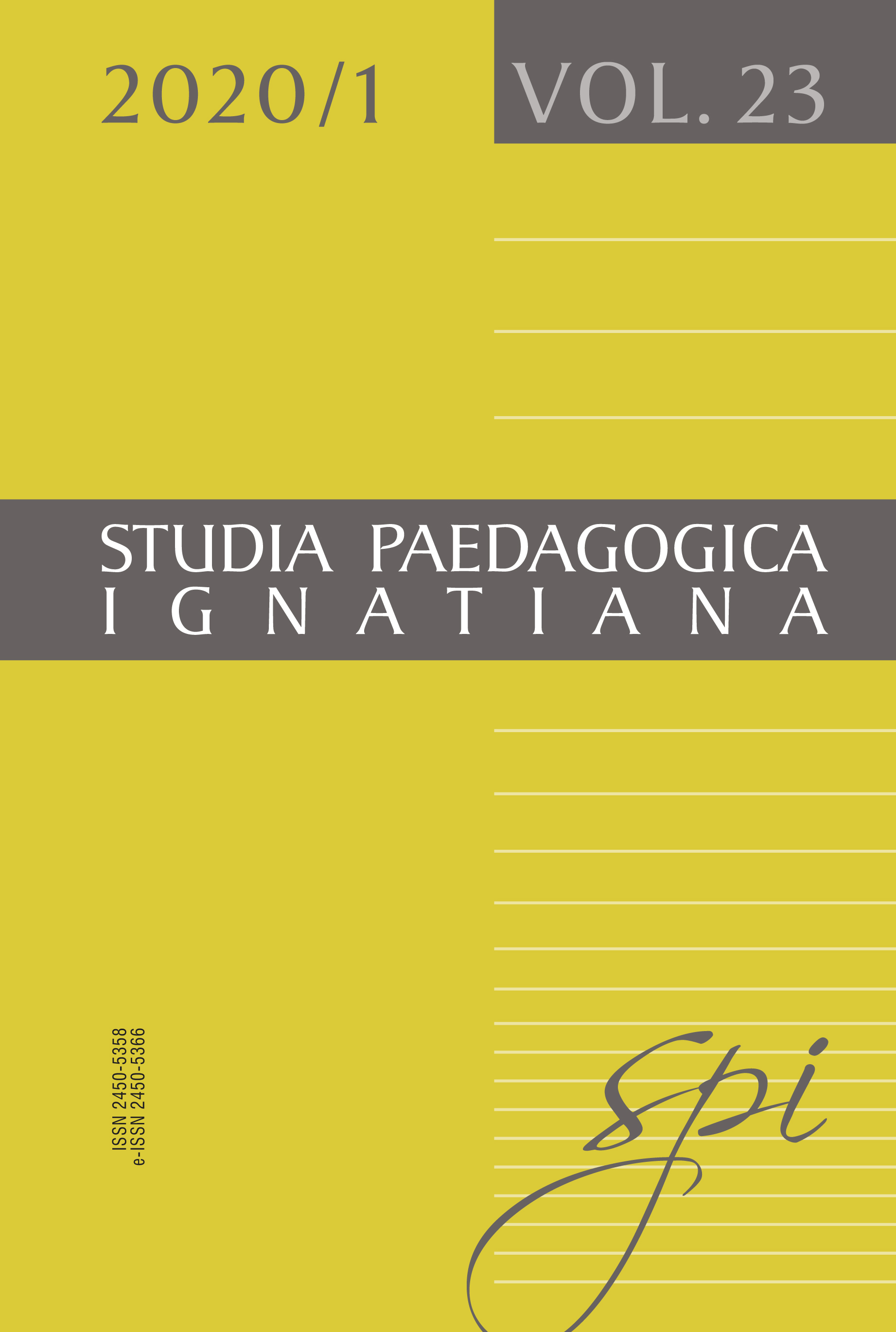Freedom and Responsibility in the Everyday Life of a Student
DOI:
https://doi.org/10.12775/SPI.2020.1.002Keywords
freedom, responsibility, trust, school, studentAbstract
When addressing topics related to values in man’s everyday life, one cannot rest at solely theoretical considerations. The challenge for all those working with other people, and especially for parents, teachers and educators, is to seek ways to introduce adolescents to the practice of values. The following text constitutes an attempt to reflect on the relationship between freedom and responsibility in the context of education. We understand maturity, among others, as the ability to find ourselves in spaces of freedom and responsibility, but to be able to pursue it, each one of us must be able to experience them from an early age.
Looking at how the modern education system operates, the author attempts to determine whether a young person finds answers to questions of what freedom is and how to understand it at school. Do the students have a sense of self-determination and responsibility for their educational progress and, if so, to what extent? By analysing the literature and describing selected elements of grass-roots activities of teachers and people involved in the discussion of the shape of education, the author tries to find out whether the school can contribute to explaining and implementing attitudes based on freedom and responsibility and, if so, to what extent. The changes taking place in today’s society require, among others, the formation of competences related to lifelong learning, and this calls for self-awareness, the ability to make decisions and take responsibility for them.
References
Budajczak M. (2004). Edukacja domowa, Gdańsk: Gdańskie Wydawnictwo Psychologiczne.
Chałas K. (2003). Wychowanie ku wartościom, t. 1, Lublin–Kielce: Wydawnictwo Jedność.
Huizinga J. (1985). Homo ludens. Zabawa jako źródło kultury, przeł. M. Kurecka, W. Wirpsza, Warszawa: Czytelnik.
Jarosz E. (2013). O potrzebie demokratyzowanie polskiej szkoły. Czas na krok następny – podmiotowość i współudział dzieci w edukacji, „Studia Edukacyjne”, nr 29, s. 49–60.
Korczak J. (1984). Pisma wybrane, t. 1, Warszawa: Nasza Księgarnia.
Kunicka M. (2012). Władza, przymus i wolność w edukacji. „Opuscula Sociologica”, nr 1, s. 31–44.
Łobocki M. (1998). Warunki kształtowania i pogłębiania poczucia odpowiedzialności u studentów, [w:] A.M. de Tchorzewski (red.), Odpowiedzialność jako wartość i problem edukacyjny, Bydgoszcz: Wydawnictwo Wers, s. 125–140.
Michałowska D.A. (2013). Edukacja demokratyczna a kreatywność. „Filozofia Publiczna i Edukacja Demokratyczna”, t. 2, nr 1, s. 58–72.
Nowicka-Kozioł M. (2005). Wolność a edukacja, „Debata Edukacyjna”, nr 1, s. 19–28.
Stern A.[ndré]. (2016). … i nigdy nie chodziłem do szkoły, przeł. B. Niedźwiecka, Gliwice: Wydawnictwo Element.
Stern A.[ndré]. (2017). Zabawa. O uczeniu się, zaufaniu i życiu pełnym entuzjazmu, przeł. B. Niedźwiecka, Gliwice: Wydawnictwo Element.
Stern A.[rno]. (2016). Odkrywanie śladu. Czym jest zabawa malarska, przeł. M. Bizub, Gliwice: Wydawnictwo Element.
Śliwerski B. (2001). Edukacja pod prąd, Kraków: Oficyna Wydawnicza „Impuls”.
Tchorzewski A. (1993). O niektórych zasadach życia społecznego jako wyznacznikach procesu edukacji, [w:] J. Górniewicz (red.), Stare i nowe dylematy teorii wychowania, Toruń: Wydawnictwo Adam Marszałek.
Suchodolski B. (1975). Labirynty współczesności. Niewola i wolność człowieka. Warszawa: Państwowy Instytut Wydawniczy.
Netografia
Baker J. (2018). Teachers should be re-named ‘learning designers, „The Sydney Morning Herald” (7.07.2018), https://www.theage.com.au/education/teachers-should-be-re-named-learning-designers-professor-20180607-p4zk4a.html [dostęp: 19.11.2019].
France P. (2018). Personalized Learning Isn’t About Tech, „Edutopia.org” (30.03.2018), https://www.edutopia.org/article/personalized-learning-isnt-about-tech [dostęp: 12.10.2019].
GratoSfera, Wprowadzanie swobodnej zabawy do szkół w Gdańsku, w Polsce, w Europie, https://597cd892-e646-4781-800a-da1b024e44ac.filesusr.com/ugd/bbba9b_08be1520022e4dd8ba66a3167c403420.pdf [dostęp: 9.01.2020].
Oczkiem w edukację. Edukacja na miarę XXI wieku, http://oczkiemwedukacje.pl/nauczyciel-a-kto-to-jest/ [dostęp: 9.01.2020].
Pytlak J. (2016). Poglądy zbyt rzadko (w szkole) kwestionowane (3), „Wokół Szkoły” (14.08.2016), http://www.wokolszkoly.edu.pl/blog/poglady-zbyt-rzadko-w-szkole-kwestionowane-3.html?fbclid=IwAR1ha8qNH40WsVXvhHV9sPvp3hB_dttL7jk0P6cta6Bg6v77-iNBFmRJuBg [dostęp: 29.12.2016].
Pytlak J. (2019). Spragnionym innowacji – pod choinkę, „Wokół Szkoły” (23.12.209), http://www.wokolszkoly.edu.pl/blog/spragnionym-innowacji-pod-choinke.html?fbclid=IwAR0HGAAGpMEVzsC24X1LQ2RgBzv17uHYRz-APVdEJk8OWCDAVQHl98fzYqY [dostęp: 29.12.2019].
Tokarz T. (2018). Celem edukacji jest rozwój dziecka, „Innowacyjna Edukacja” (27.07.2018), http://innowacyjnaedukacja.blogspot.com/2018/06/celem-edukacji-jest-rozwoj-dziecka.html [dostęp: 23.11.2019].
https://lesneprzedszkola.pl [dostęp: 9.01.2020].
https://wydawnictwoelement.com.pl/ksiazki/arno-stern-odkrywanie-sladu-czym-zabawa-malarska/ [dostęp: 9.01.2020].
Downloads
Published
How to Cite
Issue
Section
License
By submitting an article, the author declares that:
they are the author of the article (hereinafter referred to as the Work) and:
- is entitled to exclusive and unlimited copyright to the Work,
- is entitled to dispose of the copyrights to the Work.
The Author grants the Jesuit University Ignatianum in Cracow a free, non-exclusive, territorially unlimited license to use the Work in the following fields of exploitation:
- publishing the Work in paper, digital or magnetic form;
- multiplying the work by any method, without limiting the number of editions or copies;
- distribution of the work and its copies in any form, including marketing, sales, lending, and lease;
- placing the work in a computer memory;
- distribution of the work in information networks, including the Internet;
- public performance, exhibition, display, reproduction, broadcasting and re-broadcasting, as well as making the Work available to the public in such a manner that everyone could have access to it at a time and place chosen by themselves;
- within the scope of dependent rights to the Work, covering, in particular, the right to make necessary changes to the Work, resulting from editorial and methodical preparation, as well as to make translations of the Work into other languages.
The license right shall be transferred the moment of transfer of the Work to the Jesuit University Ignatianum in Cracow. The Jesuit University Ignatianum in Cracow is entitled to grant sub-licenses to the Work in terms of the right granted. The license shall be limited in time for a period of 15 years from the date it is granted.
Stats
Number of views and downloads: 2478
Number of citations: 0



